
Skunks are known for their distinct black and white-striped appearance and their potent spray used as a defense mechanism. While most people associate skunks with being nocturnal creatures, it is not uncommon to come across a skunk during the day.
Since they are mostly nocturnal creatures, skunks are most active at night. However, it is not unusual to see a skunk out and about during the day. There are several reasons why a skunk could be active in the daytime. For example, a skunk may be out foraging for food or searching for a mate. Additionally, young skunks may be more active during the day as they explore their surroundings.
Despite the potential for encountering a skunk in daylight, It's critical to keep in mind that they are wild creatures and need to be handled carefully. As generally peaceful animals, skunks will only utilize their spray as a last resort in the event that they sense danger. Seeing a skunk during the day can raise concerns about safety and health.
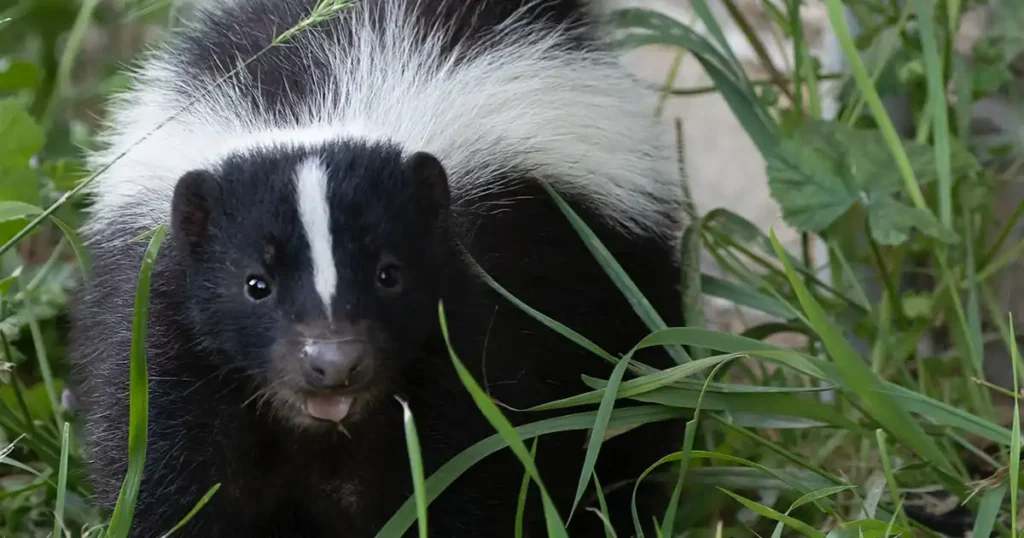
Skunks are known for their pungent odor and nocturnal habits, however, they are also visible during the day. Understanding their behavior can help people avoid unwanted encounters and appreciate these creatures.
Since they are mostly nocturnal creatures, skunks are most active at night. They usually sleep in dens or other covered places throughout the day. Since they are reproducing and tending to their young, they are particularly active during the spring and summer months.
Skunks are opportunistic feeders, and a skunk out in daytime might be foraging due to disturbances. When threatened, they are renowned for their capacity to release an offensive-smelling liquid, which can scare off predators.
While skunks are primarily nocturnal, they can also be seen during the day. This is more common in urban areas, where they may be attracted to human food sources. It is important to avoid approaching or disturbing skunks during the day, as they may feel threatened and spray.
If you do encounter a skunk in daytime it is best to give them plenty of space to avoid a skunk attack. Since skunks have limited vision but an excellent sense of smell, it's best to stay away from them up close.
Overall, understanding skunk behavior can help people coexist with these creatures and appreciate their unique qualities. By taking precautions and avoiding unwanted encounters, people can enjoy the presence of skunks in their environment.
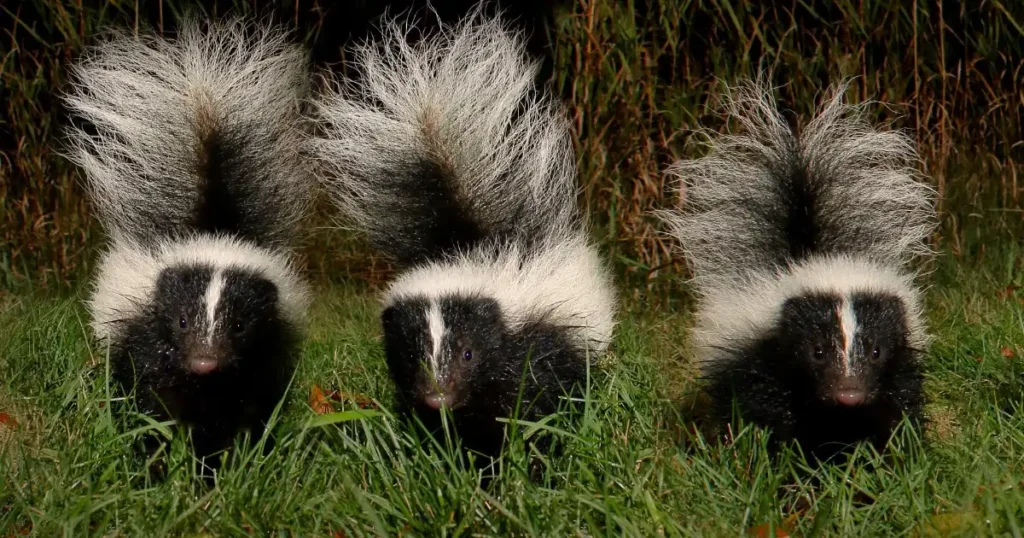
Skunks are primarily known for their nocturnal behavior, but it is not uncommon to spot them out during the day. There are several reasons skunk in the daytime may be active, including foraging, disturbance, and habitat loss.
As opportunistic eaters, skunks will exploit any food supply that comes their way. During the day, skunks may be out foraging for insects, small mammals, or even fruits and vegetables. They possess a keen sense of smell, enabling them to locate food sources from afar, which makes daytime hunting easier for them.
Skunks may also be active during the day if they are disturbed by their sleep. This could be due to human activity, predators, or other animals. Skunks are renowned for their defensive tendencies; if they sense danger, they will release a strong scent. As a result, it's crucial to respect their personal space and not bother them during the day.
As urbanization continues to expand, skunks are losing their natural habitats. This forces them to adapt to new environments, including urban areas. Skunks may be out during the day in search of shelter, food, or water. They may also be forced to forage during the day due to limited resources in their new habitat.
In conclusion, skunks can be active during the day for various reasons, such as foraging, disturbance, and habitat loss. It's crucial to give skunks plenty of space and avoid disturbing them during the day.
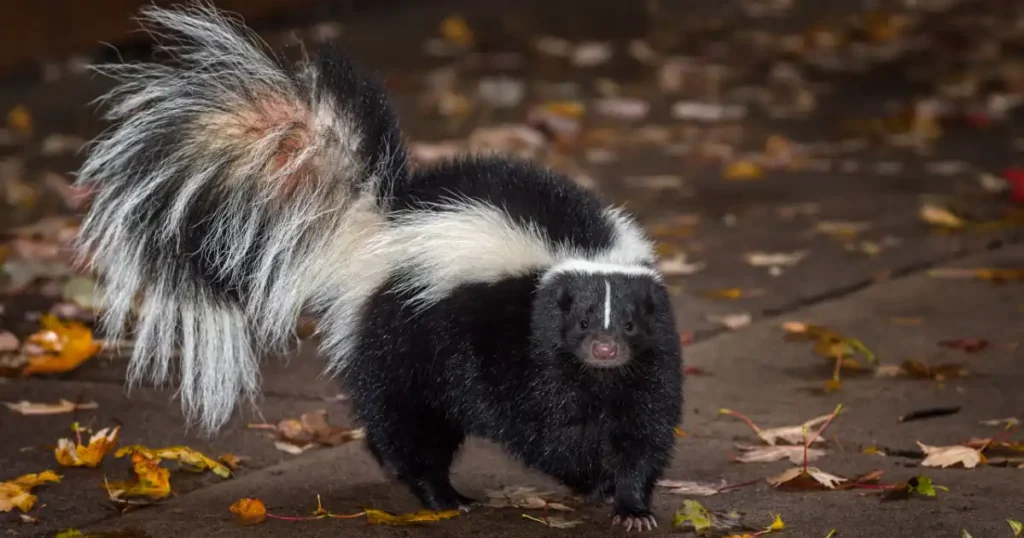
Skunks are known to carry several diseases, including rabies, and can pose a health risk to humans and other animals. If you encounter a skunk during the day, it’s important to exercise caution.
If a skunk is out in daylight, it does not necessarily mean that it is rabid. However, it is important to be aware of the symptoms of rabies in skunks, which can include disorientation, aggression, and excessive drooling. If a skunk displays any of these symptoms, it is important to avoid contact and notify animal control.
In addition to rabies, skunks can also carry other illnesses, such as leptospirosis and tularemia. These illnesses can be transmitted through contact with skunk urine or feces, as well as through bites or scratches. Wearing protective clothing and gloves is essential when handling any material that might be infected.
To prevent the spread of disease, avoid feeding or approaching skunks, and ensure garbage and food sources are securely contained. In the event of a skunk encounter, it is important to seek medical attention if bitten or scratched and to thoroughly wash any exposed skin or clothing.
Skunks can be a nuisance to humans due to their strong odor and potential to cause damage to property. There are multiple strategies to keep skunks out of a space. Eliminating potential food sources for skunks, such as pet food or trash, is one way to do this. Using repellents to stop skunks from entering a space, like ammonia or predator urine, is an additional choice. It is crucial to remember that these repellents could not work in every circumstance and might need to be reapplied frequently.
Encountering a skunk during the day is not uncommon, as skunks are crepuscular animals and may be active during daylight hours. If a skunk is encountered, it is important to remain calm and avoid startling the animal. Skunks may spray when they feel threatened or scared. To prevent a skunk attack, it's advisable to maintain a safe distance from the animal and avoid sudden movements or loud noises. If a skunk does spray, it is important to wash the affected area with a mixture of hydrogen peroxide, baking soda, and dish soap to neutralize the odor.
Overall, it is important to take preventative measures to deter skunks from entering an area and to remain cautious when encountering a skunk to avoid a potential attack.
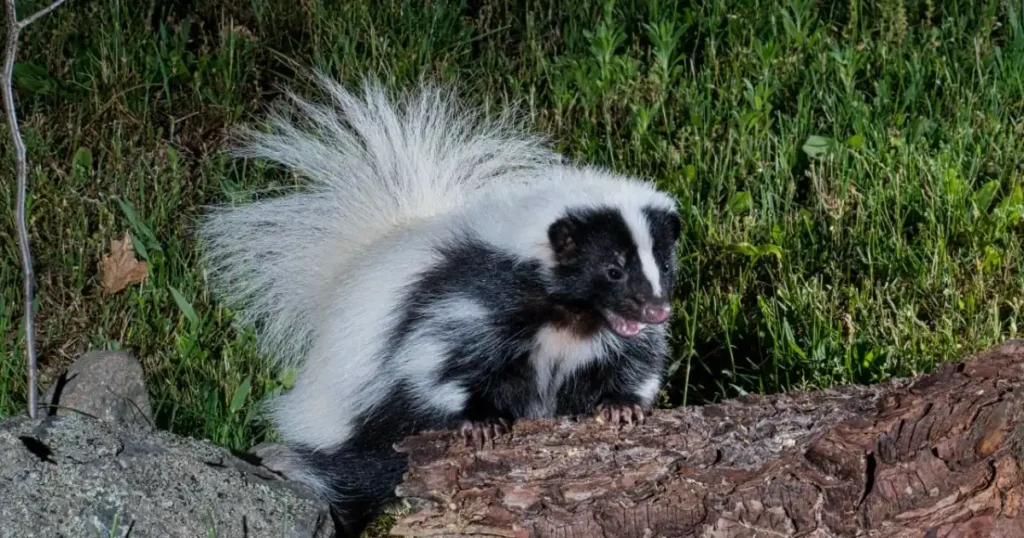
Skunks are often misunderstood and viewed as pests due to their strong odor and potential to cause damage to property. But skunks are vital to the ecology, therefore it's critical to save them.
Since skunks are naturally occurring predators of rodents, insects, and other small animals, their populations are kept under control. They aid in the dissemination of plant life throughout their habitat by acting as significant seed dispersers.
Regrettably, because of human activities like urbanization and agriculture, skunks frequently suffer from habitat loss and fragmentation. Their population and genetic diversity decline as a result, which may have detrimental effects on the ecology.
To help conserve skunk populations, it is important to protect their habitat and provide corridors for them to move between fragmented areas. This can be achieved through the creation of wildlife corridors and the preservation of natural areas.
Public education regarding the value of skunks and their place in the ecosystem is also crucial. This can help to reduce negative attitudes towards skunks and promote their conservation.
Overall, skunk conservation is important for maintaining a healthy and balanced ecosystem. By safeguarding their habitat and educating the public, we can help ensure the survival of these vital animals.
Skunks are known for their ability to adapt to various habitats. They live in deserts, grasslands, urban environments, and woodlands. Skunks prefer habitats with ample food sources, water, and shelter.
In forests, skunks can be found in areas with dense underbrush and fallen logs. They also make use of hollow trees and abandoned burrows. In grasslands, skunks are often found in prairies and meadows, where they can find insects, small rodents, and other prey.
In desert areas, skunks are found in rocky outcroppings and crevices. They are also known to take shelter in abandoned burrows of other animals. In urban areas, skunks can be found in parks, gardens, and even under buildings.
Skunk at night is common, but they can be active during the day if they feel threatened or if they are searching for food. They are solitary animals and prefer to live alone, except during mating season.
Overall, skunks are adaptable animals that can thrive in a variety of habitats. They are often seen as a nuisance in urban areas, but they play an important role in controlling insect and rodent populations.
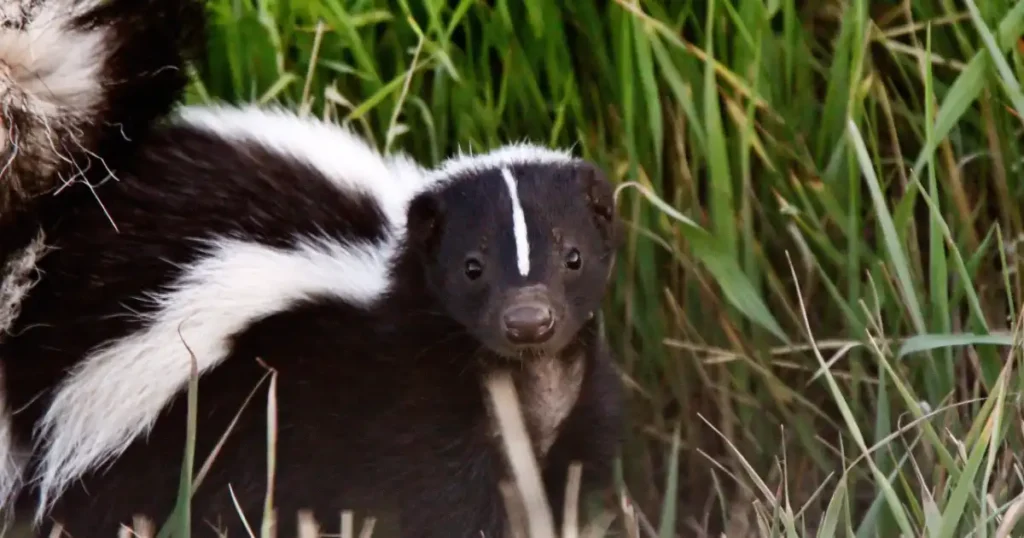
Skunks have been the subject of numerous myths and misconceptions over the years. Here are some of the most common ones:
Overall, skunks are fascinating and misunderstood animals. By learning the truth about these myths and misconceptions, we can better appreciate and coexist with these unique creatures.
Yes, it is not uncommon to see skunks out during the day. Skunks are nocturnal animals, However, they can also be active during the day, particularly in spring when they are foraging for food and seeking mates. However, if a skunk is out during the day and appears to be disoriented or lethargic, it could be a sign of rabies.
It is recommended to stay away from skunks and not to startle or intimidate them if you come across one during the day. Unless they perceive a threat or are cornered, skunks usually do not behave aggressively. If a skunk does spray you, there are a number of DIY solutions that can help get rid of the smell, like tomato juice or a solution made of baking soda and hydrogen peroxide.
Skunks with rabies may exhibit unusual behavior, such as being out during the day, appearing disoriented or lethargic, or exhibiting aggressive behavior. If you see a skunk with any of these symptoms, it is best to avoid the animal and contact animal control or a wildlife rehabilitator.
There are several effective ways to deter skunks from your property, such as securing your trash cans, removing any sources of food or water, and sealing up any potential entry points into your home or garage. You can also use natural repellents, such as predator urine or ammonia, to discourage skunks from entering your yard.
Skunks are nocturnal animals and typically feed at night. However, during the spring and summer months, they may also be active during the day in search of food.
Skunks typically take shelter during the day in dens or burrows, such as under decks, sheds, or other structures. They may also take shelter in hollow logs or trees, or in abandoned animal burrows. If you suspect that a skunk has taken up residence on your property, it is best to contact a wildlife removal professional to safely and humanely remove the animal.
Skunks, known for their pungent odor and potential property damage, can become a significant nuisance when they invade your space. However, when dealing with the challenge of skunk infestations or the need for effective removal services, turn to Critter Stop.
If a skunk is causing problems, such as digging up your yard or creating a foul smell around your property, there are humane ways to address the issue. At Critter Stop, we have years of experience providing skunk removal services in North Texas, helping homeowners protect their families, pets, and properties from skunk-related issues.
Contact us at (214) 234-2616 for a free estimate and let us help you reclaim your space from skunk intrusions.
Visit our Critter Library and learn more about our furry friends